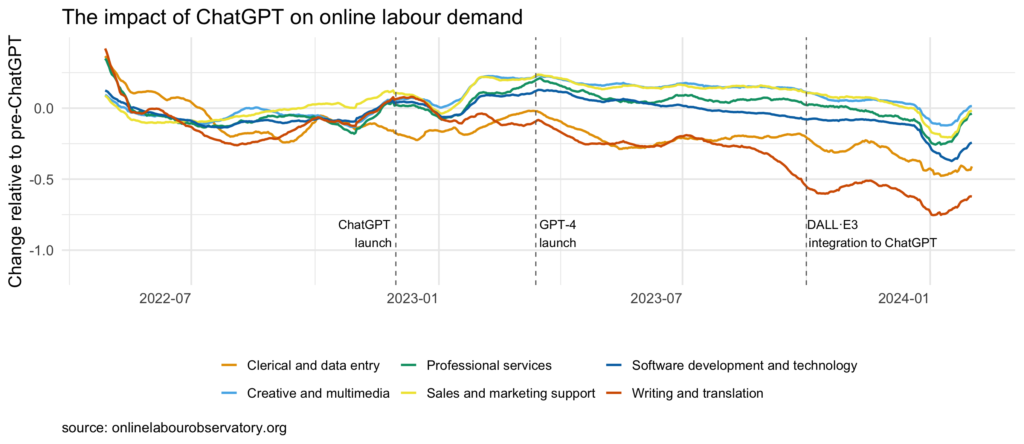Has ChatGPT affected online labour demand?

There has been a lot of discussion about how large language models (LLMs) such as ChatGPT are changing the world of work. Data on online labour demand offers a glimpse into how AI tools like ChatGPT are changing the demand for different types of online jobs. This blog post provides a nuanced analysis for the period before and after ChatGPT became widely available.
To measure change, we look at the difference in the logarithm of average demand[1] for each job category, which provides some clear patterns.

- Writing and translation jobs have seen a large drop in demand by about 10% below the pre-ChatGPT average. While further research is needed to pinpoint the specific types of writing most affected, this decline suggests that AI is already making inroads in content creation. The critical question is: are businesses opting for cheaper, AI-generated content, or is the overall demand for written content decreasing?
- Clerical and administrative jobs have also observed a decline, although not as much. Though, it is important to note that the decline in admin jobs began before ChatGPT, and it is unclear how much of this change is due to AI.
- Software development and tech jobs show no clear change, which is contrary to predictions that coders would be among the most vulnerable. The stability in demand could be due to a concurrent rise in demand for developers skilled in AI integration, the limitations of current AI in complex coding, or simply a lag before the impact becomes apparent.
- Creative and multimedia work, along with sales and marketing support, has seen a small increase in demand (around 5%). There is also a slight increase in demand for professional services. Perhaps this reflects a growing need for uniquely human skills like strategic thinking, complex problem-solving, and creative ideation – skills that AI hasn’t yet mastered.
These patterns align with recent academic research on how ChatGPT has affected labour demand. Studies suggest that generally, the negative demand effects are primarily concentrated in repetitive writing tasks, while other types of jobs are largely unaffected.
However, these observed changes in job demand diverge from the earlier predictions about AI’s potential impact. For example, some researchers have argued that programming jobs would be quite susceptible to replacement by tools like ChatGPT. In contrast, our data, which reflects actual changes in demand rather than potential exposure, reveals no such decline in programming work. This discrepancy suggests that AI’s effect on labour markets is more complex than what any single measure of exposure can capture.
The unique characteristics of the online labour market also play a crucial role. As the online labour market is highly flexible and largely unregulated, it allows for changes in demand to manifest more rapidly and intensely than in traditional labour markets. Freelancers on online platforms often lack the protections and job security of traditional employees, which means employers can adjust hiring decisions almost instantaneously. Consequently, the effects of emerging technologies like ChatGPT may appear earlier and more prominently in online work than in standard employment data.
The data presented here offers a preliminary snapshot of AI’s impact on online work. Further research is crucial to understand the long-term implications of these AI tools on the future of work. How will the balance between human skills and AI capabilities evolve? What new skills will be in demand?
[1] This is roughly equal to a percentage change, so we can interpret the results in percentage terms.
